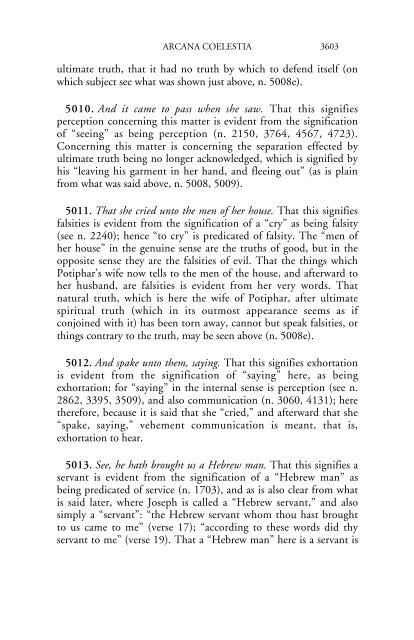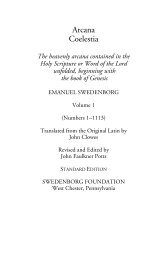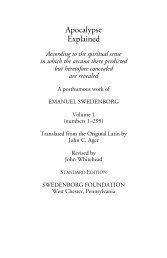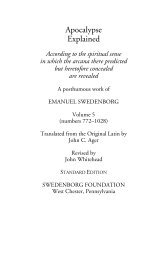- Page 2 and 3: © 2009 Swedenborg FoundationThis v
- Page 4 and 5: ARCANA COELESTIA 3563Editor’s Pre
- Page 6 and 7: ARCANA COELESTIA 3565Genesis 39CHAR
- Page 8 and 9: ARCANA COELESTIA 3567are with man p
- Page 10 and 11: ARCANA COELESTIA 356913. And it cam
- Page 12 and 13: ARCANA COELESTIA 3571[2] In respect
- Page 14 and 15: ARCANA COELESTIA 3573When Israel wa
- Page 16 and 17: ARCANA COELESTIA 3575mankind has re
- Page 18 and 19: ARCANA COELESTIA 3577the bread whic
- Page 20 and 21: ARCANA COELESTIA 3579Confess ye to
- Page 22 and 23: ARCANA COELESTIA 3581A son honoreth
- Page 24 and 25: ARCANA COELESTIA 3583that “all th
- Page 26 and 27: ARCANA COELESTIA 3585are called the
- Page 28 and 29: ARCANA COELESTIA 35874985. And Jose
- Page 30 and 31: ARCANA COELESTIA 3589signified good
- Page 32 and 33: ARCANA COELESTIA 3591are taken up i
- Page 34 and 35: ARCANA COELESTIA 35934996. Because
- Page 36 and 37: ARCANA COELESTIA 3595signifies aver
- Page 38 and 39: ARCANA COELESTIA 3597glorified his
- Page 40 and 41: ARCANA COELESTIA 3599and that his l
- Page 42 and 43: ARCANA COELESTIA 3601is not conjunc
- Page 46 and 47: ARCANA COELESTIA 36055015. He came
- Page 48 and 49: ARCANA COELESTIA 3607signifies that
- Page 50 and 51: ARCANA COELESTIA 3609If the master
- Page 52 and 53: ARCANA COELESTIA 3611from spiritual
- Page 54 and 55: ARCANA COELESTIA 3613According to t
- Page 56 and 57: ARCANA COELESTIA 36155033. Saying,
- Page 58 and 59: ARCANA COELESTIA 3617[2] As regards
- Page 60 and 61: ARCANA COELESTIA 3619of the foot an
- Page 62 and 63: ARCANA COELESTIA 3621Let the sighin
- Page 64 and 65: ARCANA COELESTIA 3623all the bound
- Page 66 and 67: ARCANA COELESTIA 3625[2] It is not
- Page 68 and 69: ARCANA COELESTIA 3627it to the Lord
- Page 70 and 71: ARCANA COELESTIA 3629and “chariot
- Page 72 and 73: ARCANA COELESTIA 36315045. Gave int
- Page 74 and 75: ARCANA COELESTIA 3633which the loin
- Page 76 and 77: ARCANA COELESTIA 3635these organs,
- Page 78 and 79: ARCANA COELESTIA 3637[3] Wherefore
- Page 80 and 81: ARCANA COELESTIA 3639obstacles; for
- Page 82 and 83: ARCANA COELESTIA 3641Genesis 40CHAR
- Page 84 and 85: ARCANA COELESTIA 3643Verily I say t
- Page 86 and 87: ARCANA COELESTIA 3645nor is it torm
- Page 88 and 89: ARCANA COELESTIA 364720. And it cam
- Page 90 and 91: ARCANA COELESTIA 3649“words” in
- Page 92 and 93: ARCANA COELESTIA 3651intellectual p
- Page 94 and 95:
ARCANA COELESTIA 3653resurrection a
- Page 96 and 97:
ARCANA COELESTIA 3655the natural ma
- Page 98 and 99:
ARCANA COELESTIA 3657[2] In the ori
- Page 100 and 101:
ARCANA COELESTIA 3659planets also b
- Page 102 and 103:
ARCANA COELESTIA 3661the offspring;
- Page 104 and 105:
ARCANA COELESTIA 3663man, and of it
- Page 106 and 107:
ARCANA COELESTIA 36655092. Each his
- Page 108 and 109:
ARCANA COELESTIA 3667body, so far i
- Page 110 and 111:
ARCANA COELESTIA 3669were in prison
- Page 112 and 113:
ARCANA COELESTIA 36715098. And saw
- Page 114 and 115:
ARCANA COELESTIA 3673and shall brin
- Page 116 and 117:
ARCANA COELESTIA 3675Divine the hum
- Page 118 and 119:
ARCANA COELESTIA 3677waters of the
- Page 120 and 121:
ARCANA COELESTIA 3679and goods of f
- Page 122 and 123:
ARCANA COELESTIA 3681In Hosea:In Jo
- Page 124 and 125:
ARCANA COELESTIA 3683spiritual chur
- Page 126 and 127:
ARCANA COELESTIA 3685[4] From this
- Page 128 and 129:
ARCANA COELESTIA 3687therefore who
- Page 130 and 131:
ARCANA COELESTIA 3689precede, and t
- Page 132 and 133:
ARCANA COELESTIA 3691[5] In Hosea:I
- Page 134 and 135:
ARCANA COELESTIA 3693speaking of th
- Page 136 and 137:
ARCANA COELESTIA 3695the goods of c
- Page 138 and 139:
ARCANA COELESTIA 3697Presently, tak
- Page 140 and 141:
ARCANA COELESTIA 3699thy sister’s
- Page 142 and 143:
ARCANA COELESTIA 3701“Babylon”
- Page 144 and 145:
ARCANA COELESTIA 3703perception is.
- Page 146 and 147:
ARCANA COELESTIA 3705Evil-merodach
- Page 148 and 149:
ARCANA COELESTIA 37075126. And thou
- Page 150 and 151:
ARCANA COELESTIA 3709is, thus neith
- Page 152 and 153:
ARCANA COELESTIA 3711soon as the he
- Page 154 and 155:
ARCANA COELESTIA 3713I was carried
- Page 156 and 157:
ARCANA COELESTIA 3715before, it may
- Page 158 and 159:
ARCANA COELESTIA 3717of friendship
- Page 160 and 161:
ARCANA COELESTIA 3719imbued with go
- Page 162 and 163:
ARCANA COELESTIA 3721[6] Profanatio
- Page 164 and 165:
ARCANA COELESTIA 3723Thou openest t
- Page 166 and 167:
ARCANA COELESTIA 3725namely, that t
- Page 168 and 169:
ARCANA COELESTIA 37275093, 5105, 51
- Page 170 and 171:
ARCANA COELESTIA 3729When thou art
- Page 172 and 173:
ARCANA COELESTIA 3731interior natur
- Page 174 and 175:
ARCANA COELESTIA 3733nothing else t
- Page 176 and 177:
ARCANA COELESTIA 3735for Pharaoh”
- Page 178 and 179:
ARCANA COELESTIA 3737of the letter,
- Page 180 and 181:
ARCANA COELESTIA 3739It shall go fo
- Page 182 and 183:
ARCANA COELESTIA 37415151. This is
- Page 184 and 185:
ARCANA COELESTIA 3743expressions in
- Page 186 and 187:
ARCANA COELESTIA 3745this is the ca
- Page 188 and 189:
ARCANA COELESTIA 3747such servants
- Page 190 and 191:
ARCANA COELESTIA 3749and perceive,
- Page 192 and 193:
ARCANA COELESTIA 3751being the cele
- Page 194 and 195:
ARCANA COELESTIA 3753extent, nor ev
- Page 196 and 197:
ARCANA COELESTIA 3755and pass into
- Page 198 and 199:
ARCANA COELESTIA 3757ascribes to a
- Page 200 and 201:
ARCANA COELESTIA 3759with and in th
- Page 202 and 203:
ARCANA COELESTIA 3761and wherever t
- Page 204 and 205:
ARCANA COELESTIA 3763
- Page 206 and 207:
ARCANA COELESTIA 376515. And Pharao
- Page 208 and 209:
ARCANA COELESTIA 376748. And he gat
- Page 210 and 211:
ARCANA COELESTIA 3769being states o
- Page 212 and 213:
ARCANA COELESTIA 3771boundary to bo
- Page 214 and 215:
ARCANA COELESTIA 3773beams forth th
- Page 216 and 217:
ARCANA COELESTIA 3775signification,
- Page 218 and 219:
ARCANA COELESTIA 3777of a “river
- Page 220 and 221:
ARCANA COELESTIA 3779kine evil in l
- Page 222 and 223:
ARCANA COELESTIA 37815209. Verses 5
- Page 224 and 225:
ARCANA COELESTIA 3783“the perishi
- Page 226 and 227:
ARCANA COELESTIA 3785reason spoken
- Page 228 and 229:
ARCANA COELESTIA 3787In Isaiah:Thou
- Page 230 and 231:
ARCANA COELESTIA 37895220. Verse 8.
- Page 232 and 233:
ARCANA COELESTIA 3791“magicians,
- Page 234 and 235:
ARCANA COELESTIA 3793above or beyon
- Page 236 and 237:
ARCANA COELESTIA 3795known in heave
- Page 238 and 239:
ARCANA COELESTIA 3797another to min
- Page 240 and 241:
ARCANA COELESTIA 37995136), thus th
- Page 242 and 243:
ARCANA COELESTIA 3801In Joel:They h
- Page 244 and 245:
ARCANA COELESTIA 3803Egypt, and sai
- Page 246 and 247:
ARCANA COELESTIA 3805known the qual
- Page 248 and 249:
ARCANA COELESTIA 3807hair of his he
- Page 250 and 251:
ARCANA COELESTIA 3809Specifically b
- Page 252 and 253:
ARCANA COELESTIA 3811Pharaoh, sayin
- Page 254 and 255:
ARCANA COELESTIA 3813“I have hear
- Page 256 and 257:
ARCANA COELESTIA 3815badness” sig
- Page 258 and 259:
ARCANA COELESTIA 3817parched with t
- Page 260 and 261:
ARCANA COELESTIA 3819Divine itself,
- Page 262 and 263:
ARCANA COELESTIA 3821Behold a great
- Page 264 and 265:
ARCANA COELESTIA 3823them seven yea
- Page 266 and 267:
ARCANA COELESTIA 3825of abundance o
- Page 268 and 269:
ARCANA COELESTIA 3827down, and pres
- Page 270 and 271:
ARCANA COELESTIA 3829the conflict i
- Page 272 and 273:
ARCANA COELESTIA 3831forward of the
- Page 274 and 275:
ARCANA COELESTIA 3833Give you men,
- Page 276 and 277:
ARCANA COELESTIA 3835hence also “
- Page 278 and 279:
ARCANA COELESTIA 3837the Lord fed f
- Page 280 and 281:
ARCANA COELESTIA 3839does not indee
- Page 282 and 283:
ARCANA COELESTIA 3841Jesus said to
- Page 284 and 285:
ARCANA COELESTIA 38435298. And let
- Page 286 and 287:
ARCANA COELESTIA 3845all things in
- Page 288 and 289:
ARCANA COELESTIA 3847rational, by J
- Page 290 and 291:
ARCANA COELESTIA 3849manifest from
- Page 292 and 293:
ARCANA COELESTIA 3851David, but the
- Page 294 and 295:
ARCANA COELESTIA 3853and in Luke:I
- Page 296 and 297:
ARCANA COELESTIA 3855Hast thou utte
- Page 298 and 299:
ARCANA COELESTIA 3857speaking of Ba
- Page 300 and 301:
ARCANA COELESTIA 3859celestial of t
- Page 302 and 303:
ARCANA COELESTIA 3861The merchants
- Page 304 and 305:
ARCANA COELESTIA 3863From all this
- Page 306 and 307:
ARCANA COELESTIA 3865the Word are s
- Page 308 and 309:
ARCANA COELESTIA 3867[8] In the sam
- Page 310 and 311:
ARCANA COELESTIA 3869chariot and th
- Page 312 and 313:
ARCANA COELESTIA 3871the Word in co
- Page 314 and 315:
ARCANA COELESTIA 38735327. And with
- Page 316 and 317:
ARCANA COELESTIA 3875involves, and
- Page 318 and 319:
ARCANA COELESTIA 3877also signifies
- Page 320 and 321:
ARCANA COELESTIA 3879into the world
- Page 322 and 323:
ARCANA COELESTIA 3881food by which
- Page 324 and 325:
ARCANA COELESTIA 3883[4] The man of
- Page 326 and 327:
ARCANA COELESTIA 38855345. And Jose
- Page 328 and 329:
ARCANA COELESTIA 3887of truth from
- Page 330 and 331:
ARCANA COELESTIA 3889Nevertheless t
- Page 332 and 333:
ARCANA COELESTIA 3891existence thro
- Page 334 and 335:
ARCANA COELESTIA 3893Exult greatly,
- Page 336 and 337:
ARCANA COELESTIA 3895In the wrath o
- Page 338 and 339:
ARCANA COELESTIA 3897tree, and prod
- Page 340 and 341:
ARCANA COELESTIA 38995360. And the
- Page 342 and 343:
ARCANA COELESTIA 39015365. And the
- Page 344 and 345:
ARCANA COELESTIA 39035367. Go unto
- Page 346 and 347:
ARCANA COELESTIA 3905the significat
- Page 348 and 349:
ARCANA COELESTIA 39075375. To Josep
- Page 350 and 351:
ARCANA COELESTIA 3909regeneration i
- Page 352 and 353:
ARCANA COELESTIA 3911[7] Again:Then
- Page 354 and 355:
ARCANA COELESTIA 3913I will give to
- Page 356 and 357:
ARCANA COELESTIA 3915Lord. What is
- Page 358 and 359:
ARCANA COELESTIA 3917they desired t
- Page 360 and 361:
ARCANA COELESTIA 3919perceiving onl
- Page 362 and 363:
ARCANA COELESTIA 39215387. They who
- Page 364 and 365:
ARCANA COELESTIA 3923where is the c
- Page 366 and 367:
ARCANA COELESTIA 3925unarmed, and k
- Page 368 and 369:
ARCANA COELESTIA 3927
- Page 370 and 371:
ARCANA COELESTIA 392916. Send one o
- Page 372 and 373:
ARCANA COELESTIA 3931THE INTERNAL S
- Page 374 and 375:
ARCANA COELESTIA 3933such truths of
- Page 376 and 377:
ARCANA COELESTIA 3935see from it wh
- Page 378 and 379:
ARCANA COELESTIA 3937effected by me
- Page 380 and 381:
ARCANA COELESTIA 3939For whosoever
- Page 382 and 383:
ARCANA COELESTIA 3941it is plain th
- Page 384 and 385:
ARCANA COELESTIA 3943receptacle of
- Page 386 and 387:
ARCANA COELESTIA 39455423. And spok
- Page 388 and 389:
ARCANA COELESTIA 3947the interior m
- Page 390 and 391:
ARCANA COELESTIA 3949will from them
- Page 392 and 393:
ARCANA COELESTIA 3951else is signif
- Page 394 and 395:
ARCANA COELESTIA 3953Socinianism, Q
- Page 396 and 397:
ARCANA COELESTIA 3955spiritual good
- Page 398 and 399:
ARCANA COELESTIA 3957themselves—f
- Page 400 and 401:
ARCANA COELESTIA 3959Furthermore, f
- Page 402 and 403:
ARCANA COELESTIA 39615450. Ye shall
- Page 404 and 405:
ARCANA COELESTIA 3963described. Thi
- Page 406 and 407:
ARCANA COELESTIA 3965desolation (n.
- Page 408 and 409:
ARCANA COELESTIA 3967our brother”
- Page 410 and 411:
ARCANA COELESTIA 3969himself to goo
- Page 412 and 413:
ARCANA COELESTIA 3971one who obeys
- Page 414 and 415:
ARCANA COELESTIA 3973because these
- Page 416 and 417:
ARCANA COELESTIA 3975influx is poss
- Page 418 and 419:
ARCANA COELESTIA 39775489. Into his
- Page 420 and 421:
ARCANA COELESTIA 3979pass into affe
- Page 422 and 423:
ARCANA COELESTIA 3981cannot think f
- Page 424 and 425:
ARCANA COELESTIA 3983“providence.
- Page 426 and 427:
ARCANA COELESTIA 39855508. And told
- Page 428 and 429:
ARCANA COELESTIA 39875509. Saying.
- Page 430 and 431:
ARCANA COELESTIA 3989internal man a
- Page 432 and 433:
ARCANA COELESTIA 3991“letting rem
- Page 434 and 435:
ARCANA COELESTIA 3993when they live
- Page 436 and 437:
ARCANA COELESTIA 3995[2] From this
- Page 438 and 439:
ARCANA COELESTIA 3997and therefore
- Page 440 and 441:
ARCANA COELESTIA 3999Lift up thine
- Page 442 and 443:
ARCANA COELESTIA 4001power (see n.
- Page 444 and 445:
ARCANA COELESTIA 4003have about the
- Page 446 and 447:
ARCANA COELESTIA 40055557. There ar
- Page 448 and 449:
ARCANA COELESTIA 4007indurations, a
- Page 450 and 451:
ARCANA COELESTIA 40095569. As there
- Page 452 and 453:
ARCANA COELESTIA 4011gain; and that
- Page 454 and 455:
ARCANA COELESTIA 401314. And God Sh
- Page 456 and 457:
ARCANA COELESTIA 4015Protesting the
- Page 458 and 459:
ARCANA COELESTIA 4017The “utteran
- Page 460 and 461:
ARCANA COELESTIA 40195579. When the
- Page 462 and 463:
ARCANA COELESTIA 4021good of spirit
- Page 464 and 465:
with a similar meaning. Again:ARCAN
- Page 466 and 467:
ARCANA COELESTIA 4025[6] “the ang
- Page 468 and 469:
ARCANA COELESTIA 40275593. Except y
- Page 470 and 471:
ARCANA COELESTIA 4029evident from t
- Page 472 and 473:
ARCANA COELESTIA 4031and therefore
- Page 474 and 475:
ARCANA COELESTIA 4033east, and so o
- Page 476 and 477:
ARCANA COELESTIA 4035his hand upon
- Page 478 and 479:
ARCANA COELESTIA 4037[9] As regards
- Page 480 and 481:
ARCANA COELESTIA 4039preceding chap
- Page 482 and 483:
ARCANA COELESTIA 4041receive you gr
- Page 484 and 485:
ARCANA COELESTIA 4043speaking of th
- Page 486 and 487:
ARCANA COELESTIA 4045denotes an abu
- Page 488 and 489:
ARCANA COELESTIA 4047they are quali
- Page 490 and 491:
ARCANA COELESTIA 4049of worship wou
- Page 492 and 493:
ARCANA COELESTIA 4051by falsities,
- Page 494 and 495:
ARCANA COELESTIA 4053[2] Terah’s
- Page 496 and 497:
ARCANA COELESTIA 4055signification
- Page 498 and 499:
ARCANA COELESTIA 4057feels happines
- Page 500 and 501:
ARCANA COELESTIA 4059good; and from
- Page 502 and 503:
ARCANA COELESTIA 4061reformed and f
- Page 504 and 505:
ARCANA COELESTIA 4063and would ther
- Page 506 and 507:
ARCANA COELESTIA 4065anxious, and s
- Page 508 and 509:
ARCANA COELESTIA 4067is of the exte
- Page 510 and 511:
ARCANA COELESTIA 4069called those t
- Page 512 and 513:
ARCANA COELESTIA 4071they find it n
- Page 514 and 515:
ARCANA COELESTIA 4073[3] Because su
- Page 516 and 517:
ARCANA COELESTIA 4075him” means t
- Page 518 and 519:
ARCANA COELESTIA 4077and bowed them
- Page 520 and 521:
ARCANA COELESTIA 4079enlightenments
- Page 522 and 523:
ARCANA COELESTIA 4081by influx from
- Page 524 and 525:
ARCANA COELESTIA 4083for the interm
- Page 526 and 527:
ARCANA COELESTIA 4085[3] All that i
- Page 528 and 529:
ARCANA COELESTIA 40875693. And he s
- Page 530 and 531:
ARCANA COELESTIA 4089face is the ex
- Page 532 and 533:
ARCANA COELESTIA 4091inverted order
- Page 534 and 535:
ARCANA COELESTIA 4093the Word, were
- Page 536 and 537:
ARCANA COELESTIA 4095regenerated is
- Page 538 and 539:
ARCANA COELESTIA 4097interior is in
- Page 540 and 541:
ARCANA COELESTIA 4099is a cause in
- Page 542 and 543:
ARCANA COELESTIA 4101upon my body i
- Page 544 and 545:
ARCANA COELESTIA 4103they instigate
- Page 546 and 547:
ARCANA COELESTIA 41055722. There ar
- Page 548 and 549:
ARCANA COELESTIA 4107smallest and m
















